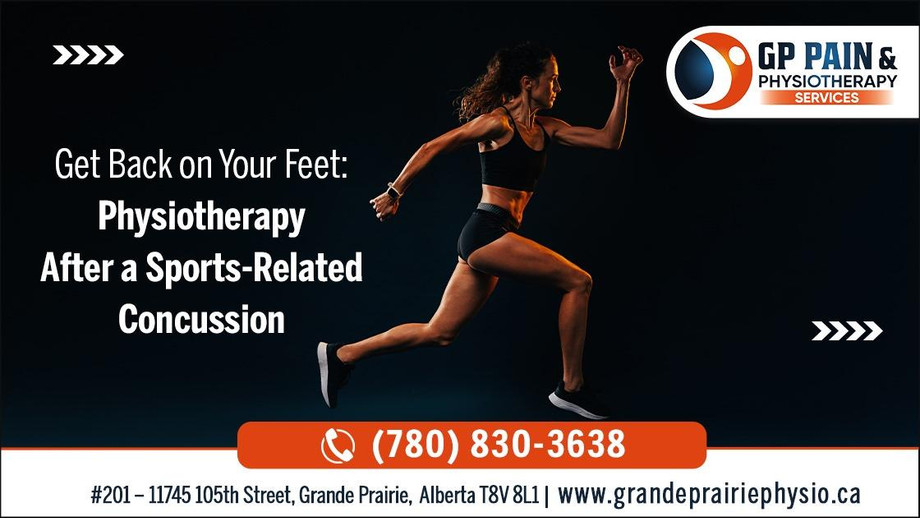Sports physiotherapy is a specialized branch of physiotherapy that focuses on the prevention, treatment, and rehabilitation of injuries related to sports and exercise. At G P Pain & Physiotherapy , our team of skilled sports physiotherapists is dedicated to helping athletes of all levels achieve optimal performance and recover from injuries. Here are some of the common conditions that sports physiotherapy Grande Prairie:
Acute Sports Injuries
Sprains and Strains
Ankle Sprains: Common in sports involving running and jumping, ankle sprains occur when the ligaments around the ankle are overstretched or torn.
Muscle Strains: Overuse or sudden force can lead to strains in muscles like the hamstrings, quadriceps, or calf muscles, causing pain and limited mobility.
Fractures and Dislocations
Fractures: Breaks in bones, often resulting from high-impact sports or falls, require immediate and comprehensive rehabilitation to ensure proper healing and regain strength.
Dislocations: Dislocations, such as shoulder or knee dislocations, occur when bones are forced out of their normal positions, necessitating reduction and rehabilitation to restore function and stability.
Ligament Injuries
Anterior Cruciate Ligament (ACL) Injuries: Common in sports like soccer, basketball, and skiing, ACL injuries can be severe and often require surgical intervention followed by extensive physiotherapy for recovery.
Medial Collateral Ligament (MCL) Injuries: Typically caused by direct blows to the knee, MCL injuries need targeted rehabilitation to restore stability and function.
Overuse Injuries
Tendinitis
Achilles Tendinitis: Overuse of the Achilles tendon, common in runners and athletes involved in jumping sports, leads to pain and inflammation at the back of the ankle.
Patellar Tendinitis: Known as jumper’s knee, this condition affects the tendon connecting the kneecap to the shinbone, causing pain and swelling in the front of the knee.
Stress Fractures
Common Sites: Stress fractures, often seen in athletes engaged in repetitive, high-impact activities like running and gymnastics, commonly occur in the lower leg, foot, or hip.
Management: Sports physiotherapists provide guidance on activity modification, rehabilitation exercises, and gradual return to sports to prevent recurrence.
Bursitis
Shoulder and Hip Bursitis: Inflammation of the bursae, the fluid-filled sacs that cushion joints,
can result from repetitive motions and overuse, pain and restricted movement.
Chronic Conditions
Osteoarthritis
Joint Degeneration: Athletes, particularly those in high-impact sports, may experience early onset of osteoarthritis in weight-bearing joints like the knees and hips. Physiotherapy helps manage pain, improve mobility, and maintain joint health.
Chronic Pain Syndromes
Chronic Exertional Compartment Syndrome: Common in runners and athletes with repetitive lower limb activities, this condition causes pain and swelling in the legs due to increased pressure in the muscle compartments.
Tendinopathies
Rotator Cuff Tendinopathy: Overhead sports like baseball, tennis, and swimming can lead to chronic inflammation and degeneration of the rotator cuff tendons in the shoulder, requiring targeted rehabilitation to restore function.
Post-Surgical Rehabilitation
ACL Reconstruction
Rehabilitation Phases: Post-surgical rehabilitation for ACL reconstruction involves multiple phases, from immediate post-operative care to strengthening and return-to-sport training.
Goals: Sports physiotherapists aim to restore knee stability, strength, and functional movement, ensuring a safe return to athletic activities.
Meniscus Repairs
Rehabilitation Protocols: Customized rehabilitation protocols for meniscus repairs focus on reducing swelling, restoring knee range of motion, and gradually progressing to strength and functional training.
Shoulder Surgeries
Rotator Cuff Repairs: Post-operative rehabilitation for rotator cuff repairs includes pain management, range of motion exercises, and progressive strengthening to regain shoulder function.
Labral Repairs: Following labral repair surgery, sports physiotherapists guide athletes through a structured rehabilitation program to restore shoulder stability and prevent future dislocations.
Performance Enhancement and Injury Prevention
Biomechanical Analysis
Movement Assessment: Sports physiotherapists conduct thorough biomechanical analyses to identify faulty movement patterns and correct them, reducing the risk of injuries and enhancing performance.
Customized Exercise Programs: Based on the analysis, individualized exercise programs are designed to improve strength, flexibility, and overall athletic performance.
Education and Training
Injury Prevention Strategies: Athletes are educated on proper techniques, warm-up routines, and stretching exercises to prevent injuries.
Sport-Specific Training: Tailored training programs focus on the specific demands of the athlete’s sport, optimizing performance and reducing the likelihood of injury.
Conclusion
Sports physiotherapists at G P Pain & Physiotherapy in Grande Prairie treat a wide range of conditions, from acute injuries and overuse syndromes to chronic conditions and post-surgical rehabilitation. By providing comprehensive care that includes injury management, rehabilitation, and performance enhancement, we help athletes recover quickly and safely, allowing them to return to their sports stronger and more resilient. Whether you're dealing with a recent injury or looking to improve your athletic performance, our team is here to support you every step of the way. Contact us today to learn more about our sports physiotherapy services and how we can help you achieve your goals.
#sportsinjuryphysiotherapygrandeprairie #sportsinjuryphysiotherapy #sportsinjuryphysiotherapynearme #gppainphysicaltherapy #grandeprairiephysiotherapy #physiotherapynearme #physiotherapygrandeprairie #physicaltherapygrandeprairie #physicaltherapynearme #physicaltherapy #physiotherapistclinic #physiotherapytclinic #physicaltherapyclinic

